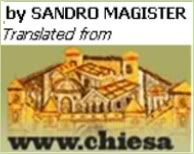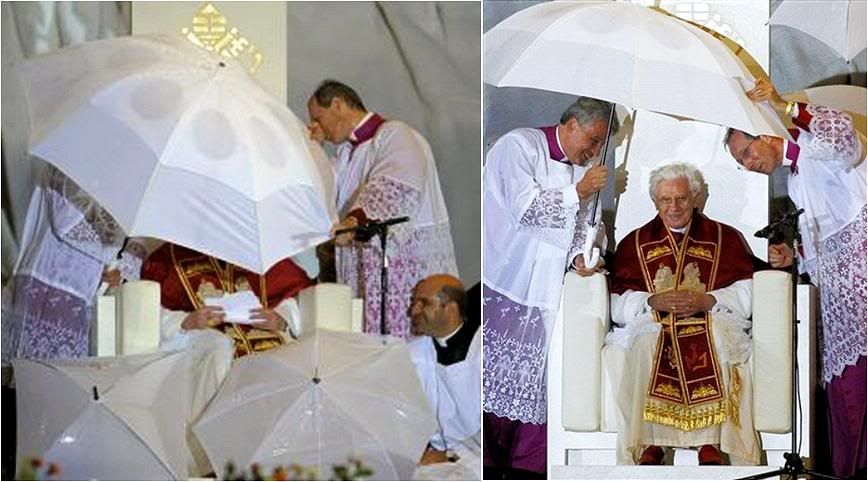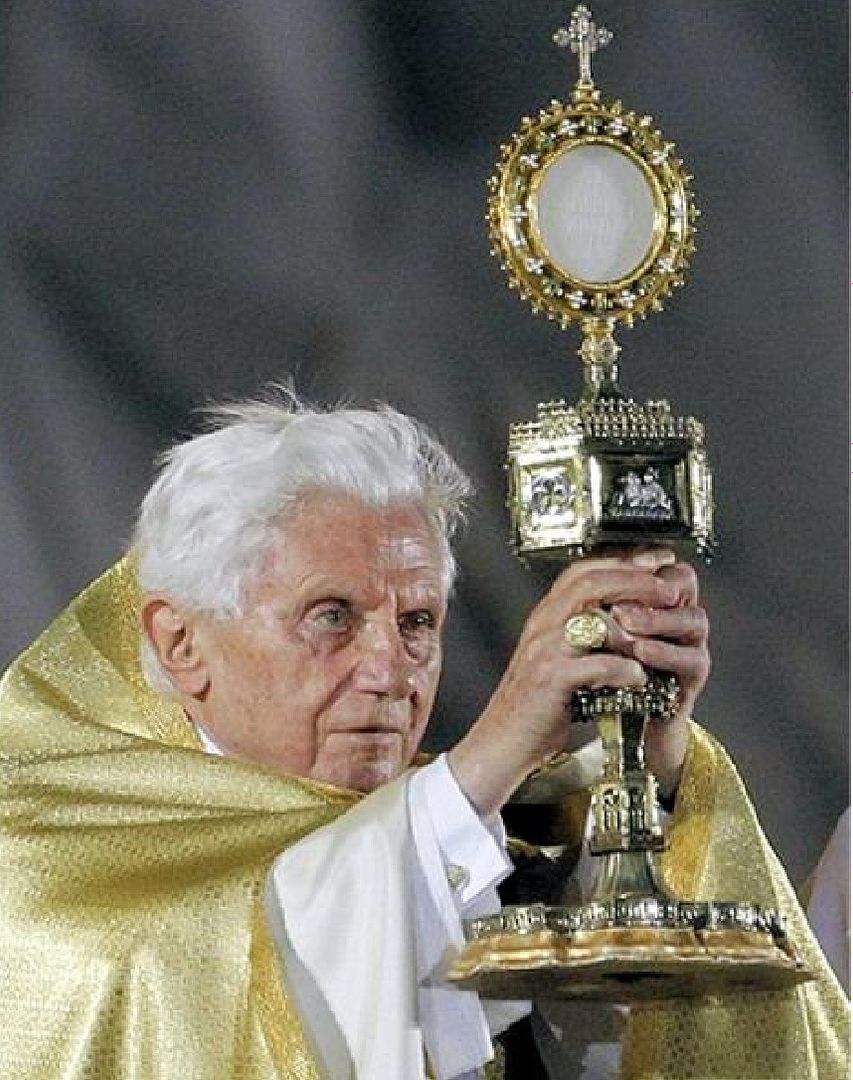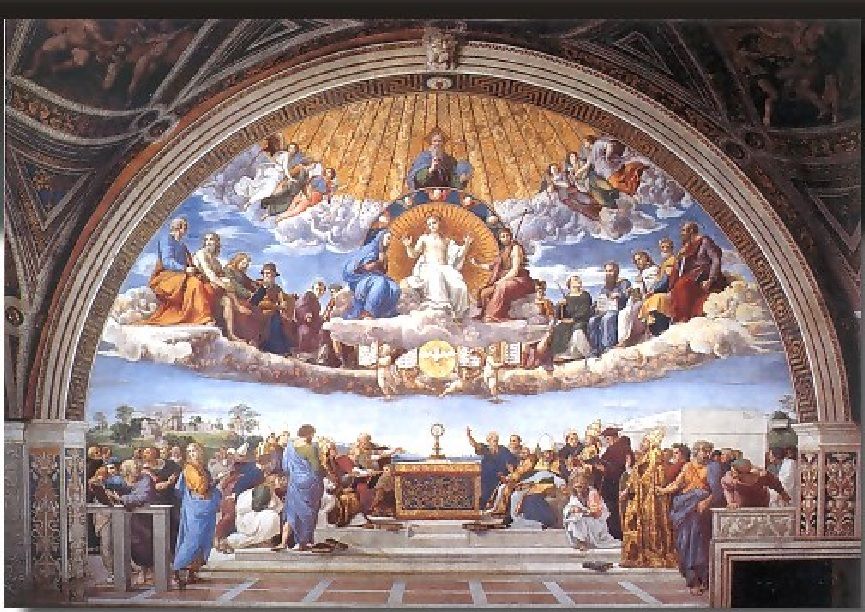
 At 85, Pope Benedict
At 85, Pope Benedict
more inspiring than ever
Seven years after his election, he remains
exemplary in his humility and trust in God
By Francis Phillips

Friday, 27 April 2012
Reading the very moving testimony of Pope Benedict XVI on his 85th birthday on April 16
[the writer is referring to the extemporaneous homily given by the Pope at his birthday Mass in the Pauline Chapel], I was struck by the strong faith he radiated.
Of course, if you are Pope it goes without saying that you must have “faith”, but nonetheless, to stand firm on the world’s stage as an old man, knowing that the media is watching and waiting for you to show obvious evidence of age, is a sign of great inner strength.
It was an inspiring Christian witness – and so much more uplifting than all the gloomy predictions of what will happen in our own approaching demographic winter in the UK.
The Pope said, “I am in the final stage of my life’s journey and I do not know what awaits me. However, I do know that the light of God exists, that He rose again, that His light is stronger than all darkness, that the goodness of God is stronger than all the evil in this world. This helps me to continue with confidence…”
It says everything about trust, about belief and about the meaning of life, faced as we are all the time by the seemingly incomprehensible “darkness” of evil deeds.
On April 19 the Holy Father also celebrated the seventh anniversary of his election as Pope. It made me look again at the section “Habemus Papam” in his book of 2010:
Light of the World, a conversation with Peter Seewald.
Probed by the interviewer to describe his emotions on being elected, Pope Benedict replied simply, “Seeing the unbelievable now actually happen was really a shock. I was convinced there were better and younger candidates. Why the Lord settled on me, I had to leave to him. I tried to keep my equanimity, all the while trusting that he would certainly lead me now.
I would have to grow slowly into what I could do in each given situation and always limit myself to the next step…”
Again, there is the evidence of great trust, humility – and an echo of John Henry Newman’s words, “One step enough for me”. I would like to think that his visit to England for the beatification of Blessed John Henry has been for the Holy Father one of the highlights of his pontificate so far.
A final thought: I was slightly pulled up by the Pope’s remarks at the end of his Wednesday catechesis on April 25, when he recalled “our constant duty to drive carefully and with a sense of responsibility”. Oh dear. There was a time when my driving licence testified to several speeding fines and I was teetering on a ban.
Mercifully those days are now behind me. Let’s hope I’m not a menace on the roads if I live to reach the Pope’s age.

 Sandro Magister also finally filed his seventh anniversary tribute to the Pope, but I find it flawed by his failure to check a few basic facts (trusting his memory instead) and by a couple of conclusions that I respectfully disagree with.
What distinguishes Benedict XVI
Sandro Magister also finally filed his seventh anniversary tribute to the Pope, but I find it flawed by his failure to check a few basic facts (trusting his memory instead) and by a couple of conclusions that I respectfully disagree with.
What distinguishes Benedict XVI
after seven years as Pope -
He will perhaps be remembered more for his homilies than his encyclicals
And for his daring moves which are usually far from mainstream.
As in the Madrid WYD, during a sudden and violent thunderstorm...

ROME, April 27, 2012 – No one said it last week in the flood of tributes to Benedict XVI on his seventh anniversary as Pope. But the element which most revealed the profound sense of his Pontificate was a summer thunderstorm.

It was a torrid night in Madrid in August 2011. In front of Pope Benedict, on the vast esplanade of a disued airportm a nkllion and a half young people, average age 22, largely 'unknown'.
Suddenly, a torrent of rain with thunder, lightning and huge winds struck the assembly, out in the open, without refuge. Clusters of spotlights fell off their moorings, posters and other light items were blown away, and even the Pope appeared drenched
[despite the huge umbrellas his aides vainly tried to shield him with].
But he stayed where he was, to the explosive jubilation of his audience, their spirits undampened by the unexpected manifestation from the heavens.
When the wind and rain ceased, after about 20 minutes, the Pope disposed of his prepared text and spoke briefly to the soggy assembly.
[Actually, he then left the stage briefly to change into vestments for the Eucharistic Benediction and Adoration, while stage crew checked out there was no structural damage to the stage and its hangings.]

He asked them to look to Jesus, living and present in the consecrated host, the Blessed Sacrament on the altar. World Youth Day 2010: the Eucharistic Adoration.
And he knelt in worshipful silence. The cue for his congregation to kneel on the soggy ground. And so they remained in total silence. For as long as their Pope led them.
[Later, before leaving them for the night, he said the following: “Dear young people we have lived an adventure together; firm in our faith in Christ we have resisted the rain! Before I go I would like to wish you all a good night. Thank you for your joy and your resistance! Thank you for the incredible example you have given. Like this night with Christ. you can always overcome life’s trials, never forget this!” A most fitting end to an episode unprecedented in papal annals.]
This was not the first time that Benedict XVI had set the example for Eucharistic Adoration at World Youth Day. He did it at the first one he attended in Cologne in 2005, to the wonder of many.
[For the first time the world saw almost a million young people kneel in silent worship of the Eucharist, on that field in Marienfeld. And it would happen again on a racetrack outside Sydney at WYD 2008. On a smaller scale, with the Catholics of London in Hyde Park, September 2010, and with the youth of Croatia in Zagreb in 2011.]
In evaluating this Papacy, few have understood the audacity of these actions which are far from mainstream. But when Benedict XVI does them and explains why, he does so with the calmness of someone who is not inventing anything of his own, but is simply going into the depth of human adventure and Christian mystery.

Five centuries ago, Raphael, in his sublime fresco entitled "Disputation over the Blessed Sacrament' found in the Apostolic Palace, had placed the consecrated host in the center of his composition, on the altar of a grand cosmic liturgy in which the Father, the Son and the Holy Spirit interact with the earthly and cedlestial Church, in time and eternity.
When Benedict XVI convoked his first Assembly of the Bishops' Synod in 2005, he dedicated it to the Eucharist. [I don't know how Magister can make this mistake about a fact I had supposed everyone covering the religious beat would know: The Synodal Assembly was convoked the previous year by John Paul II, who decided it would be dedicated to the Eucharist. Benedict XVI did 'benefit' enormously from inheriting the Synodal Assembly, for which he then wrote that amazing Post-Synodal Apostolic Exhortation that remains one of the best texts of his Pontificate - in an embarrassment of great texts - but it is simply wrong to say he convoked it.]
It was his idea to have an image of that very fresco by Raphael projected on the wall screens in the Synod Hall for the benefit of all the bishops of the world.
A great deal of discussion ahs been generated by Benedict XVI's erudite lectures at the Unviersity of Regensburg and the College des Bernadins in Paris, at London's Westminster Hall and in the German Bundestag.
But it will be shown one day that the true distinction of this Pope are his homilies, as they had been centuries ago for Pope Leo the Great, the Pope who stopped Attila the Hun at the gates of Rome.
[Magister is probably biased by the fact that he has made it his admirable task to compile Benedict XVI's homilies and Angelus messasges throughout the liturgical year for the past three years now and will probably continue. But IMHO, Benedict XVI is distinguished by - and will be remembered long after - for more than just his homilies, but for the extraordinary richness of his writing in all genres of papal documents and secular texts. Of course, his homilies are great, and would tend to be remembered more, or quoted more, because they are brief. But how can anyone say that the text of JESUS OF MAZARETH or of Spe salvi or Sacramentum caritatis or Verbum Domini, or the Regensburg and Bernardins lectures, just off the top of my head (because they happen to be my favorite texts), are any less great and memorable???? Nor can one discount those texts addreessed primarily to the secular world, because I have not come across any Church historian pointing to any precedent or parallel text from previous Popes.]
Benedict XVI's homilies are those that attract the least notice. He says them during Mass
[or Vespers]/ Thus, perilously near
[why 'perilously?] Jesus whom he indicates to all as present in the bread and wine - the Jesus whom, as he preaches tirelessly, was the very same who had explained the Sacred Scriptures to the two disciples on the road to Emmaus, who were so similar to the disoriented men today, the Jesus who revealed himself to them when he broke the bread - as in Caravaggio's famous painting at the National Gallery in London - and who vanished from sight as soon as they recognized him. Because that is how faith is, it is never a view that is geometrically complete, but the inexorable play between freedom and grace.
To the little or no faith of so many men today, to the Mases that have been trivially reduced to peace 'embraces' and brotherly assemblies, Pope Benedict instead offers a palpable faith in the God who makes himself near to us, who loves and forgives, and who gives us himself so we may partake of his Body and Blood.
This was the faith of the early Christians, as Benedict XVI recalled in his Angelus homily two Sundays ago. The designation of Sunday as 'the Lord's Day', he said, was a gesture of revolutionary daring by the Apostles, because the event that it recalled had been so extraordinary and overwhelming: the resurrection of Jesus, as well as his subsequent appearances as the Risen Lord among his disciples, which fell on the 'first day of the week', the day God began Creation.
The earthly bread that becomes communion with God, Benedict said in another homily, "is the start of the transformation of the world - into a world of resurrection, a world of God".
Now, a further reservation about Magister's primary statement. The extraordinary fact of what took place at Cuatro Vientos in August 2011 was not that the Pope had stayed despite the near-Biblical tempest - I cannot imagine any other Pope who would not have done what he did.
The extraordinary thing was for the Eucharistic Adoration to take place as it did, for Benedict XVI to have decided not to forego the high point of the program - literally, come hell or high water - out of any misplaced 'consideration' for his congregation ("The poor dears - they're wet and cold and uncomfortable. Let's not put them through another half hour in their condition!").
He judged correctly that these hundreds of thousands who had kept him company for three days already, had not come to Madrid to be 'comfortable' but to find their faith, to show their faith, and to be proven in their faith. So, of course, they had no problem joining him in Eucharistic Adoration. That, to me, after the compelling reality of one and a half million people kneeling on the mud for Eucharistic Adoration, was the other extraordinary thing - the Pope's faith in this young people, and his confidence that his faith in them is not misplaced.
Note from the Patrons of the Vatican Museums about the Raphael fresco:
The Disputation over the Blessed Sacrament (or more appropriately, The Triumph of Religion), painted by Raphael between 1508 and 1511, represents Christianity’s victory over and the transformation of the multiple philosophical tendencies shown in the School of Athens fresco on the opposite wall. The theologians of the Disputation are not gathered in a vaulted temple like the philosophers of the School. Instead, their bodies make up the Church’s architecture. They form one body, united in an ethereal apse flanking the Trinity and the Eucharist, that when consecrated becomes the body of Christ.

 And here is an exceptional tribute from one of the Hispanic world's most followed religion writers, the 71-year-old veteran newsman, reputed to have 'good' contacts in the Vatican, and who is better known by the title of his column/blog, which translates to 'The stork in the tower'... Bear with the introduction, which includes references to recent ecclesial events in Spain...
An extraordinary Pope
And here is an exceptional tribute from one of the Hispanic world's most followed religion writers, the 71-year-old veteran newsman, reputed to have 'good' contacts in the Vatican, and who is better known by the title of his column/blog, which translates to 'The stork in the tower'... Bear with the introduction, which includes references to recent ecclesial events in Spain...
An extraordinary Pope
by F.J. Fernandez de la Cigona
Translated from


April 25, 2012
We are living through some thrilling days for the Church. With a lot of news. That fortunately is all good. If some days, one is hard put to find a subject to write about, these days there is a surfeit.
It seems as if someone has taken the bull by its horns, at last, and is doing extraordinary things, God be blessed.
The Pope, in his solemn homily at the Chrismal Mass, reproached the dissident Austrian parish priests for their disobedience. The Spanish bishops are doing the same for the theologian Andres Torres Queiruga
[apparently, someone whose writings are habitually in contradiction to orthodox Catholic doctrine]. And in Ireland, the Vatican has ordered two dissident Redemptorists to observe a period of silence. In Argentina, the resignation of a 57-year-old bishop has been accepted.
[Must look this up. Can't give a parenthetical explanation because I know nothing about it.]
And the bishop of Alcala (Spain), object of a true lynching because he sustains the doctrine of the Church, is getting multiple new supporters - a phenomenon that has not been seen in Spain for a long time. The only surprise it the silence of his brothers in the episcopate which, fortunately for them, none of whom seemed to understand his attitude, is starting to break.
Those who have now come over to the bishop who is being punished for being faithful are his brother bishops from Calahorra, Cordoba, Solsona, and the ermitus bishop of Mondonedo-Ferrol. One hopes more will be joining them.
There's more. The worst religious sisters in the United States have been placed under supervision by the Holy See.
The liturgy of the Neo-Catechumenal Way, a movement which is doing much good for the Church, is being reviewed by the Congregation for the Doctrine of the Faith, which should end, once and for all, polemics over whether their Masses are fully acceptable, or whtehr they need some corrections which doubtless will be accepted by the 'kikos'
[a designation used for the Neocats by the Hispanic media after Kiko Arguello, one of the movement's founders] because of their unquestioned love for the Church and the Pope.
[Cigona must be a good friend of the Neocats, because he glosses over the fact that the Pope already warned them of their idiosyncratic Mass five years ago but they have done nothing about it so far. That's disobedience, too, as the assertive sisters of the LCWR and the Austrian priests have shown, only to a lesser degree but equally selfish. The Neocats have been accused of two major ecclesial faults all these years - this insistence on devising their own version of the Mass, and their apparent failure to work with the local dioceses in which their missionary families live. Neither of those faults can be taken lightly.]
And what seems to me the most important of all, the Lefebvrian almost-schism, fracture, rupture or however you call it, appears to be on the way to an imminent resolution. God grant that at the last minute, so many hopes will not be dashed.
For one month, that's not bad at all. I would never have dreamt of so much good news in the Church. Well, yes, I dreamt it, though firmly convinced that it could only be a dream.
But an extraordinary Pope, all of 85 years, is showing a vitality and an energy that was hardly imaginable earlier. So slight in appearance, so frail, so humble, so wise, he has taken hold of the tiller of the Church, a ship whipped by constant storms, with a strength that is not natural in old age. It is the strength of the Holy Spirit.
John Paul II certainly prepared the way. As well as his successor. But what we are seeing with this Pope, who was expected to have a brief transitional Pontificate, has exceeded all expectation. Even the most optimistic.
He has begun the eighth year at the helm of the Church. There were those who did not think he would live this long. There are those who would now evoke that Gospel passage: "How well it is here. Let us make three tents..."
[Peter at the Mount of Transfiguration.]
Holy Father, wse Catholics would like to build you a beautiful tent so that you may always be among us. How well we are with you! A tent that will protect you from attacks by the enemies of God and the Church, and in which you will be happy, surrounded by the love of your children.
It had seemed impossible for anyone to become loved following the phenomenon of John Paul II. Who made all the Catholics in the world fall for him. John Paul the Great. He died in the odor of sanctity and the grief of multitudes.
The bar had been set inaccessibly high. More so for an aged Pope, with the light step and the shy smile. A gentle breeze following a veritable cyclone. An actor who filled the stage and knew it, and a successor who seems to curl up into himself whenever the curtain rises.
After Beethoven's Ninth Symphony with its choral apotheosis, it was said that no greater music could possibly be performed by any orchestra.
Now, we have Mozart with his delicate harmonies which has similarly been received passionately by a public that had thought the earlier concert could not possibly be equalled.
And I am sure that the 'Santo subito' proferred by the multitude in St. Peter's Square, inspired by some supernatural power, in April 2005, and which the whole world heard and echoed, will be repeated one day which, God grant, may yet be far away.
Cigona must be praised for the audacity of his concluding sentence and its total unepectedness. None of the most ardent Benedict admirers in the media has dared say anything like it, and who knows if they have even thought it! Though it is something we Benaddicts have always thought, along with the inevitable 'Dpctor of the Church' that must come with sainthood in his case. From our minds and hearts into God's ear!
Now, Cigona would really have pushed the limits of audacity if instead of the somewhat inadequate title "An extraordinary Pope', Cigona had insisted that his article be entitled 'The next santo subito', which would have been logical! That would have made the whole world take notice, and lead to some interesting media pyrotechnics as the first anniversasyr of JPI's beatification approaches! But Benedict XVI does not need that kind of media atention for now - who knows what horrors his enemies would generate with the uproar. He is, and God knows, that's what counts.
However, I have a minor problem with Cigona's last metaphors. Beethoven's Ninth with its choral 'Ode to Joy' is something obviously associated with Benedict XVI and used as a soundtrack for many of the documentaries about him. If I am not mistaken, it is also the one work that has been performed for him more than once at the Vatican.
I know that Cigona means to use Beethoven and John Paul II as parallel 'greats' in their respective fields. And that the Benedict-Mozart metaphor is prompted by the current Pope's love of Mozart. Except that Mozart's music antedated Beethoven's by quite a few generations. And so the musical metaphors are somewhat faulty though well-meant.
But let that not detract from the power of his conclusion!
[Modificato da TERESA BENEDETTA 28/04/2012 04:00]